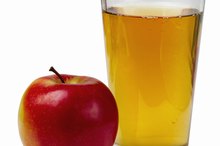Gout & Diet Soda
Gout, a type of arthritis, is affecting more people in the United States today 1. According to MedlinePlus, 3.9 percent of the population, or 8.1 million Americans suffered from gout in 2008, an increase from the 2.7 percent who experienced gout attacks in the late 1980s and early 1990s. A build of urate crystals in the joints, most notably the big toe, causes the pain, selling and redness of gout. While obesity and high blood pressure may increase the risk of gout, researchers recently have implicated soda, but not diet soda, as a possible gout trigger.
If you are experiencing serious medical symptoms, seek emergency treatment immediately.
Mechanism
Urate crystals form in people who have high levels of uric acid in their blood. The breakdown of purines found in food and also produced naturally by your body leads to uric acid production. Fructose, the sugar found in sweetened soft drinks as well as other drinks, such as fruit juice, is the only sugar linked to an increased risk of gout, Johns Hopkins Medicine reports. Because diet soda does not contain fructose, drinking diet soda does not increase your risk of developing gout.
- Urate crystals form in people who have high levels of uric acid in their blood.
- The breakdown of purines found in food and also produced naturally by your body leads to uric acid production.
Effects
Does Soda Affect Arthritis?
Learn More
A study conducted by the Arthritis Research Centre of Canada and reported in the January 15, 2008 issues of “Arthritis and Rheumatism” examined the connection between soft drinks and uric acid. The study, reported by rheumatologist Hyong Choi, M.D. examined data from the Third National Health and Nutrition Examination Survey conducted between1988–1994. The review found that serum uric acid levels rose in proportion to the number of soft drinks consumed per day. People who drank orange juice daily had a modest increase in uric acid levels as well. Fructose accelerates purine synthesis, while other simple sugars do not, according to the report. Diet sodas did not increase uric acid levels.
- A study conducted by the Arthritis Research Centre of Canada and reported in the January 15, 2008 issues of “Arthritis and Rheumatism” examined the connection between soft drinks and uric acid.
- The review found that serum uric acid levels rose in proportion to the number of soft drinks consumed per day.
Significance
The Arthritis Research Centre of Canada also published a report in the January 2008 “British Journal of Medicine” which examined data from the Health Professionals Follow-up Study, which followed 46,393 men for a 12-year period. This study found that men who drank two or more servings of soda containing fructose each day were 85 percent more likely to develop gout than those who rank only one serving per month, Johns Hopkins Medicine reports. Men who drank just one soda per day increased their risk by 45 percent, according to the study. Fructose-rich juices as well as fruits also increased the risk of developing gout, but diet sodas did not.
- The Arthritis Research Centre of Canada also published a report in the January 2008 “British Journal of Medicine” which examined data from the Health Professionals Follow-up Study, which followed 46,393 men for a 12-year period.
- This study found that men who drank two or more servings of soda containing fructose each day were 85 percent more likely to develop gout than those who rank only one serving per month, Johns Hopkins Medicine reports.
Prevention
Strawberries for Gout
Learn More
Drinking diet soda rather than soda containing fructose may reduce your risk of developing gout. Drinking diet soda will cut calories as well, which can lead to weight loss and a decrease in another risk factor for gout---obesity.
Related Articles
References
- Arthritis Today: Soda Increases Risk of Gout
- "British Medical Journal:" Soft drinks, Fructose Consumption, and the Risk of Gout in Men: Prospective Cohort Study Hyon Choi; 2008
- National Institute of Arthritis and Musculoskeletal and Skin Diseases. Gout. Updated April 2016.
- Zhang Y, Chen C, Choi H, et al. Purine-rich foods intake and recurrent gout attacks. Ann Rheum Dis. 2012; 71(9):1448-53. doi:10.1136/annrheumdis-2011-201215
- Fischer E. Ueber die Harnsauer. 1 [On Uric Acid. 1]. Berichte der Deutschen Chemischen Gesellschaft. 1884: 17:328-338. doi:10.1002/cber.18980310304
- Ragab, G., Elshahaly, M., & Bardin, T. (2017). Gout: An old disease in new perspective – A review. Journal of Advanced Research, 8(5), 495–511. doi:10.1016/j.jare.2017.04.008
- Centers for Disease Control and Prevention. Gout. Updated January 28, 2019.
- Zgaga, L., Theodoratou, E., Kyle, J., Farrington, S. M., Agakov, F., Tenesa, A., … Campbell, H. (2012). The Association of Dietary Intake of Purine-Rich Vegetables, Sugar-Sweetened Beverages and Dairy with Plasma Urate, in a Cross-Sectional Study. PLoS ONE, 7(6), e38123. doi:10.1371/journal.pone.0038123
- Choi HK, Gao X, Curhan G. Vitamin C intake and the risk of gout in men: a prospective study. Arch Intern Med. 2009;169(5):502–507. doi:10.1001/archinternmed.2008.606
- Zhang Y, Neogi T, Chen C, Chaisson C, Hunter DJ, Choi HK. Cherry consumption and decreased risk of recurrent gout attacks. Arthritis Rheum. 2012;64(12):4004–4011. doi:10.1002/art.34677
- Arthritis Foundation. Gout Diet: Dos and Don’ts.
- Boban M, Modun D. Uric acid and antioxidant effects of wine. Croat Med J. 2010;51(1):16–22. doi:10.3325/cmj.2010.51.16
- Caliceti C, Calabria D, Roda A, Cicero AFG. Fructose Intake, Serum Uric Acid, and Cardiometabolic Disorders: A Critical Review. Nutrients. 2017;9(4):395. Published 2017 Apr 18. doi:10.3390/nu9040395
- U.S. Department of Health and Human Services and U.S. Department of Agriculture. 2015–2020 Dietary Guidelines for Americans. 8th Edition. Published December 2015.
- U.S. Department of Health and Human Services. Gripped by Gout. NIH News in Health. Published February 2014.
- Kakutani-Hatayama M, Kadoya M, Okazaki H, et al. Nonpharmacological Management of Gout and Hyperuricemia: Hints for Better Lifestyle. Am J Lifestyle Med. 2015;11(4):321–329. Published 2015 Sep 2. doi:10.1177/1559827615601973
Writer Bio
A registered nurse with more than 25 years of experience in oncology, labor/delivery, neonatal intensive care, infertility and ophthalmology, Sharon Perkins has also coauthored and edited numerous health books for the Wiley "Dummies" series. Perkins also has extensive experience working in home health with medically fragile pediatric patients.









